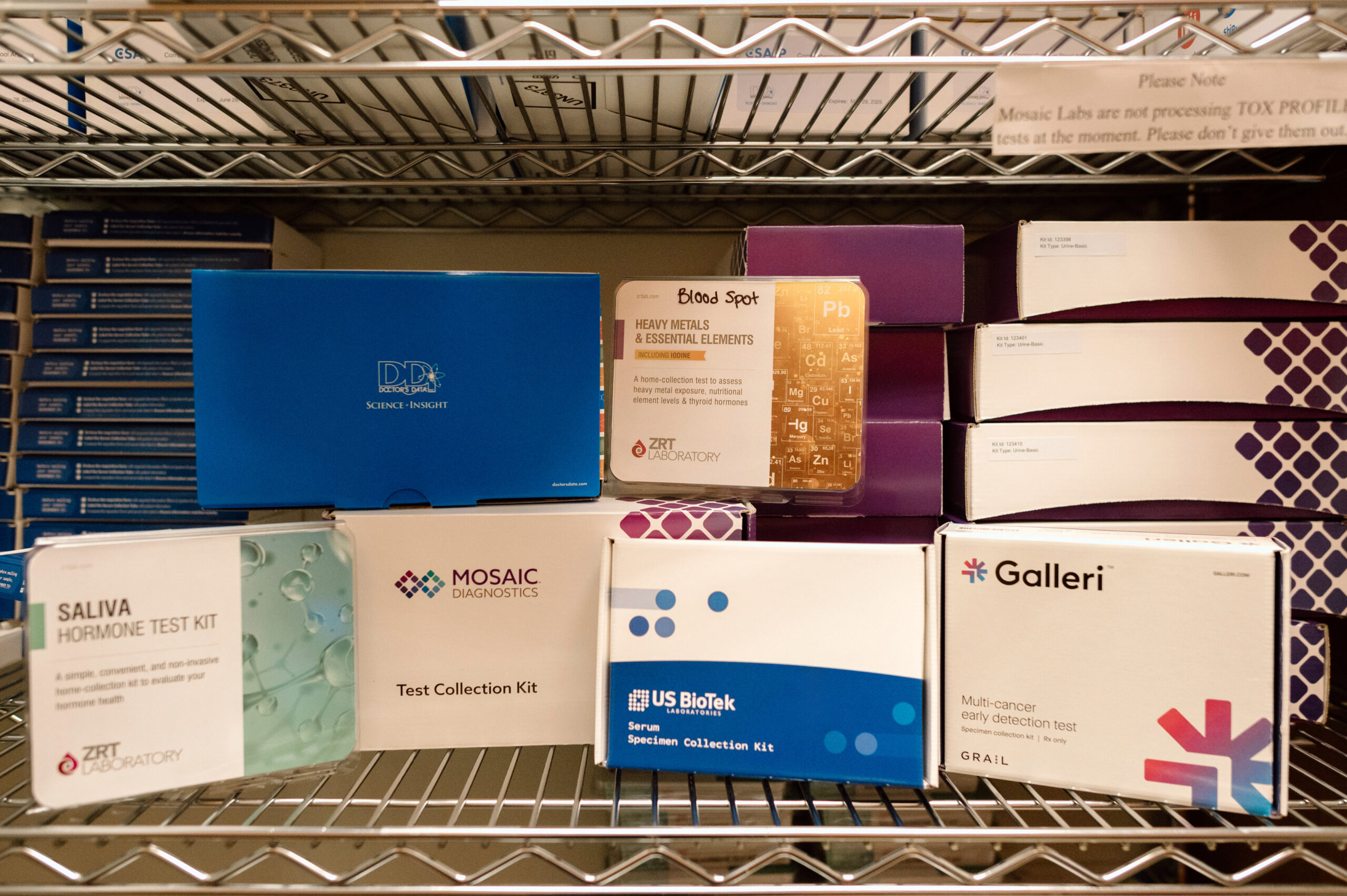Functional testing in integrative medicine refers to in-house or at-home test kits designed to assess the functionality of various systems in the body rather than just looking for disease markers. These tests provide a comprehensive picture of how well the body’s organs and systems are working, which can help identify imbalances or dysfunctions that may not yet have manifested as diseases but could lead to health issues if left unaddressed.
Key Characteristics of Functional Testing
- Holistic Approach:
- Focuses on the body as an interconnected system rather than isolated parts.
- Aims to identify root causes of symptoms and health issues.
- Preventive Focus:
- Helps detect imbalances before they develop into more serious conditions.
- Emphasizes maintaining optimal health and preventing disease.
- Personalized Care:
- Provides detailed information about an individual’s unique biochemical makeup.
- Guides personalized treatment plans tailored to the individual’s specific needs.
Types of Functional Tests
- Comprehensive Stool Analysis:
- Assesses gut health by examining the presence of beneficial bacteria, pathogens,
digestive function, and inflammation markers. - Helps diagnose conditions like IBS, IBD, and other gastrointestinal disorders.
- Assesses gut health by examining the presence of beneficial bacteria, pathogens,
- Hormone Panels:
- Measures levels of hormones such as cortisol, estrogen, testosterone, and thyroid
hormones. - Useful for diagnosing hormonal imbalances that can affect mood, energy, weight,
and overall health.
- Measures levels of hormones such as cortisol, estrogen, testosterone, and thyroid
- Food Sensitivity and Allergy Testing:
- Identifies food sensitivities, allergies, and intolerances that can cause chronic
inflammation and other symptoms. - Helps tailor dietary plans to avoid problematic foods and improve health
outcomes.
- Identifies food sensitivities, allergies, and intolerances that can cause chronic
- Micronutrient Testing:
- Evaluates levels of vitamins, minerals, and antioxidants in the body.
- Identifies deficiencies or imbalances that can lead to fatigue, immune dysfunction,
and other health issues.
- Heavy Metal Testing:
- Detects the presence of toxic metals like lead, mercury, and arsenic in the body.
- Important for diagnosing and treating heavy metal toxicity, which can affect
neurological and overall health.
- Comprehensive Blood Panels:
- Includes tests for markers like cholesterol, glucose, inflammatory markers, and
more. - Provides a broad overview of an individual’s metabolic and cardiovascular health.
- Includes tests for markers like cholesterol, glucose, inflammatory markers, and
- Mycotoxin Testing:
- Detects the presence of toxic compounds produced by mold in the body.
- Important for diagnosing mold toxicity, which can cause a variety of symptoms including chronic fatigue, respiratory issues, and cognitive dysfunction.
- Glyphosate Testing:
- Measures the levels of glyphosate, a common herbicide, in the body.
- Helps assess potential exposure and its impact on health, including possible links to chronic diseases and gut health issues.
- Lyme Disease Testing:
- Tests for the presence of Borrelia burgdorferi bacteria, which causes Lyme disease and other co-infections such as Babesia, Bartonella, and more.
- Important for diagnosing Lyme disease, especially in cases where symptoms are vague and overlap with other conditions.
- Genetic Testing:
- Analyzes an individual’s DNA to identify genetic predispositions to certain health conditions.
- Provides insights into how the body processes nutrients, detoxifies, and responds to environmental factors
Benefits of Functional Testing
- Early Detection: Identifies potential health issues before they become serious.
- Targeted Treatment: Allows for more precise and effective treatment plans.
- Improved Outcomes: Enhances overall health and well-being by addressing root causes.
- Personal Empowerment: Provides individuals with detailed information about their health, empowering them to make informed decisions.

How Functional Testing is Used in Integrative Medicine
- Diagnosis: Helps pinpoint specific dysfunctions that contribute to health issues.
- Treatment Planning: Guides the development of personalized treatment plans that may include dietary changes, supplements, lifestyle modifications, and other therapies.
- Monitoring Progress: Tracks changes and improvements over time, allowing for adjustments in treatment as needed.


